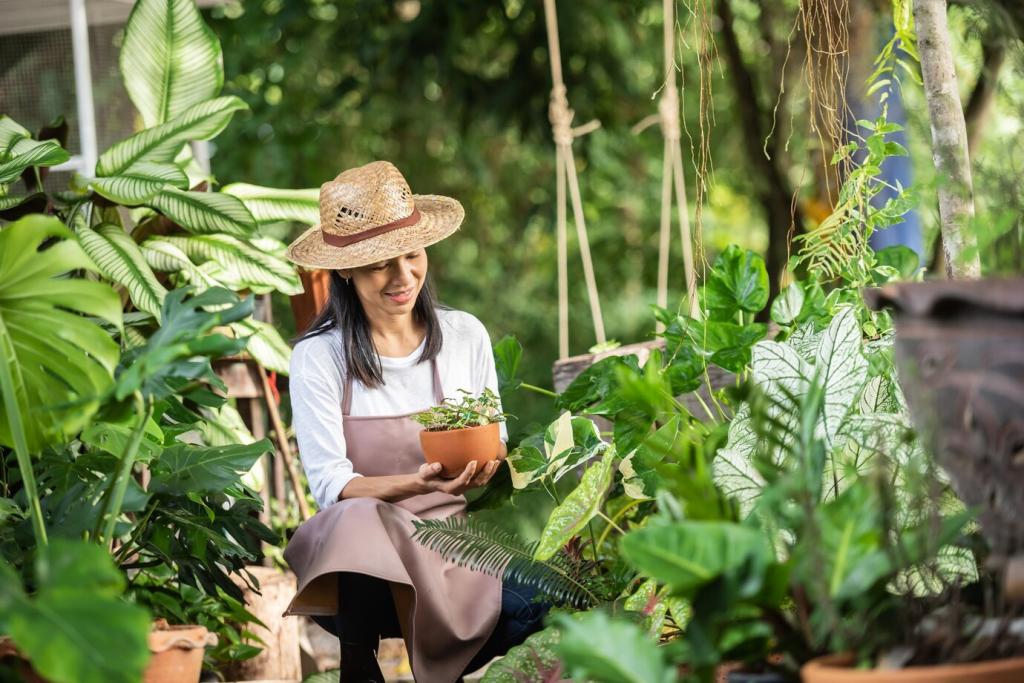
Urban Gardening: A Natural Stress Reliever
Urban gardening has emerged as a revitalizing oasis amidst the hustle and bustle of city life, offering a unique antidote to the stresses associated with urban living. With concrete and skyscrapers dominating the modern skyline, pockets of green created through urban gardens serve as much more than just aesthetic enhancements; they cultivate places of tranquility, mindfulness, and well-being. This page dives into how urban gardening acts as a powerful natural stress reliever, exploring its impact on mental health, community, creativity, and sustainable well-being.
The Therapeutic Power of Green Spaces
Mindfulness and Connection
Engaging in urban gardening encourages a mindful approach to everyday life. As gardeners tend to plants and observe their slow, purposeful growth, they naturally shift focus away from anxiety-inducing thoughts. The repetitive actions of planting, watering, and pruning ground individuals in the present moment, fostering a sense of mindfulness. This, in turn, helps ease daily worries and builds inner calmness, allowing urban dwellers to reconnect with the rhythms of nature even in the heart of the city.
A Multisensory Escape
Urban gardens stimulate the senses in ways that are soothing and restorative for the mind. The earthy scent of soil, the gentle rustle of leaves, and the vibrant colors of blooms combine to create a gentle, immersive environment. These sensory experiences work together to calm a racing mind, providing a healthy contrast to the overwhelming stimuli common in urban environments. Time spent tending to a garden, or simply relaxing within one, can help restore a sense of equilibrium amid the chaos of daily life.
Evidence from Research
Scientific studies increasingly support the idea that cultivating and maintaining a garden in urban areas contributes significantly to stress reduction. Research has shown that individuals who participate in gardening activities experience lower levels of depression and anxiety, along with improvements in overall well-being. These findings highlight the important role urban gardening can play not just as a hobby, but as a component of holistic mental health care for city residents.

Strengthening Community Ties
When neighbors come together to nurture a shared urban garden, new relationships take root. Working side by side, participants form friendships and strengthen local networks as they exchange advice, seeds, and stories. The act of collaborating for a common goal fosters trust, cooperation, and a deeper sense of belonging in the city, counteracting the anonymity that city life can sometimes impose.
Intergenerational Learning
Urban gardens frequently become centers of learning and exchange between generations. Older residents may share traditional gardening knowledge, stories, and techniques with younger participants, who might, in turn, introduce fresh ideas or sustainable practices. This exchange not only strengthens community bonds but also passes essential life skills from one generation to the next, enriching the entire neighborhood through shared experience.
Events and Celebrations
Community gardens often serve as venues for events, workshops, and seasonal celebrations. These gatherings transform the garden into a lively social hub where residents celebrate accomplishments, exchange harvests, and foster an inclusive urban culture. Participating in such events can alleviate feelings of stress and loneliness, strengthening individuals’ connections to both each other and the environment.
Creativity and Personal Growth
01
Within the boundaries of a small balcony or rooftop, gardeners creatively arrange plants, containers, and decorative elements to reflect their personal tastes. This act of creation transforms an otherwise dull space into a unique haven that provides the gardener with pride and satisfaction. Expressing oneself through gardening becomes a joyful process that counteracts stress and fosters a sense of accomplishment.
02
Urban gardening often presents unique obstacles, such as limited space, variable light, or air pollution. Overcoming these challenges requires problem-solving and adaptability, which in themselves are empowering experiences. By finding solutions and watching their efforts flourish, urban gardeners build confidence and inner strength, both of which are invaluable tools in navigating life’s stresses.
03
Cultivating a city garden is a continuous learning journey. Through trial and error, research, and shared experience, urban gardeners acquire new skills related to plant care, sustainability, and design. This ongoing education keeps the mind active and engaged, serving as a productive outlet for stress by channeling energy into meaningful growth and discovery.
